By KIM STIVERS
Memorial Health System
CHAPMAN - For many years, George Fink ran a small successful Heating, Plumbing, and Air Conditioning repair business in Chapman. Those who know him would say he’s always busy doing something, and rarely sits still. George loved to play golf, and managed to get in at least several rounds a week. At home, he mowed three acres, tended a vegetable garden, and kept up with the general maintenance on his home and vehicles all on his own.
For the most part, George had always been in good health. He maintained his fitness and muscle strength, and rarely fell ill. His high blood pressure and cholesterol were managed well with medication. George did not ignore his health, as he knew the importance.
In January 2020, amidst the COVID-19 pandemic, George saw his primary care doctor for a regular check-up. The doctor noted that George had an elevated PSA, but said it would only need to be monitored. He thought, “Okay, no problem.” He had no other health issues, no prior hospitalizations. He did have a heart murmur, which was known to him since he was a young boy, but it too had never caused any trouble.
Fast forward to late summer, August 2020. George began complaining about hip pain, but thought it was from playing golf. His hip pain stopped, and he began to experience back pain, which seemed to him to be a strain. Although aggravating, the pain did not substantially curtail his ability to work or be physically active.
George was not getting better. His wife, Millie, noticed he was walking with an odd and unusual gait. His ability to walk continued to deteriorate. On Sept. 3, George was walking, using a golf club for a cane, and helping himself to maintain balance by holding onto door jambs and furniture.
Millie and George went to see the doctor that day. Things were not getting better, in fact, things were getting worse, and fast, but still no answers were found as to what was causing this drastic change in his health and mobility.
By Monday, Sept. 14, George could not walk, and fell to the ground several times. (He had fallen a few days earlier cutting his eyebrow and cheek, blacking an eye.) Millie had no choice but to rent a wheelchair, where George sat all the remainder of that day. “I knew something was desperately wrong,” Millie explained. “He never moved from the wheelchair, not even to use the restroom.”
The next morning, Sept. 15, George and Millie’s sons loaded their dad into the car, and Millie drove him to Topeka, to the Stormont-Vail’s Emergency Room. He underwent several MRIs, a CT scan, and numerous diagnostic tests. George had emergency surgery to remove a cancerous tumor from his spine. He was diagnosed with Stage 4 prostate cancer that had metastasized to his spine.
“The cancer can be managed, but not cured,” they were told. The surgeon also informed Millie that George would never walk again, “His paraplegia is termed as incomplete, stemming from spinal cord compression from the tumor.”
“Life sometimes throws a curve,” Millie said. She had worked her entire career as a social worker, so she knew what they were facing. She knew life had changed forever, and all she could think about was what she was going to do to help him get the help and resources he needed to get well, and get home.
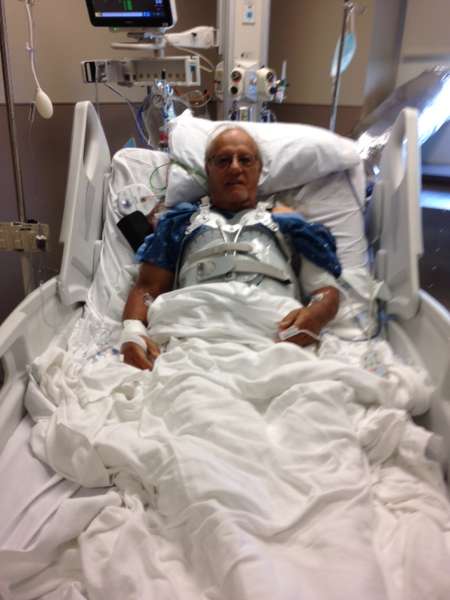
On Sept. 21, George was admitted to Kansas Rehabilitation Center (KRC), in Topeka. He had no use of his legs, or much else. He began receiving occupational and physical therapy services, and his cancer was under treatment.
Five weeks into rehabilitation at KRC, George could flex his thigh and calf muscles, and move his toes. He could not move his legs or pull up his knees, and he had to wear a vest as he was not able to sit up without its support.
While at KRC, he contracted COVID-19 and was hospitalized again at Stormont-Vail with pneumonia. Millie also contracted COVID-19. George spent five days in Stormont-Vail and was returned to KRH with no visitation allowed, on antibiotics, no rehabilitation, and had essentially lost any progress he had made. Millie also recovered from the virus at home, remembering, “I had a hard time resting, because I knew there was a lot of work to be done at home to prepare for George to come home.”
He was dismissed to home on Nov. 6, still in the thoracic vest, much weight loss, unable to sit up, and 13 different prescribed medications.
Home Health came to their home that evening. George began receiving PT, OT, bath services, nursing care, and the loan of much equipment: lift, wheelchair, gait belts, bath/toileting bench, transfer board, etc. During a visit on Nov. 19, his heartbeat soared, the Home Health nurse called 911, ambulance personnel were quickly on the scene, and he was transported to the Emergency Department at Salina Regional Health Center.
“That episode was attributed to effects from COVID-19,” Millie explained. “Essentially, the Home Health nurse and ambulance responders saved his life that night.”
George again recovered and returned home.
Home Health and Hospice of Dickinson County, along with visits to the Memorial Hospital Wound Center, George began making major progress. “The physical therapists worked with him to the point where he was able to hoist himself upright by the pool table at home,” Millie said. “He regained upper body strength, was able to maintain balance, and transfer himself from bed to wheelchair, to toilet to bath, and in and out of the car.”
A very kind individual gave him an electric wheelchair and lift. “All it took was two new batteries in the wheelchair and George had so much more mobility to go outside, go to his shop, wander the yard’” Millie said.

By the end of February 2021, when the home health staff felt he had met all the set goals, and PT/OT had done all they could at home, George was referred to Memorial Hospital’s Rehabilitation and Sports Medicine, in Abilene, for outpatient physical therapy.
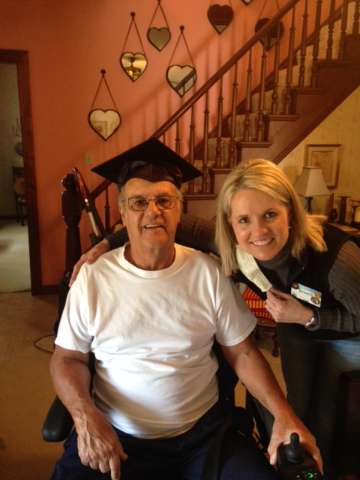
“Saying goodbye to all the wonderful people from Home Health was a mix of sadness and hopefulness, but still hard since we were now on our own for all those services, with which they had been such a great help. I cannot say enough about the kindness and professionalism shown by the Home Health staff,” Millie said.
Today, Millie and George can be found at Memorial Hospital’s Rehabilitation and Sports Medicine clinic three days per week.
“George is relentless at completing his strengthening exercises,” Physical Therapist, Jeff Sanborn said. “He recently walked 120 feet with very little assistance. It is amazing to see his progress.”
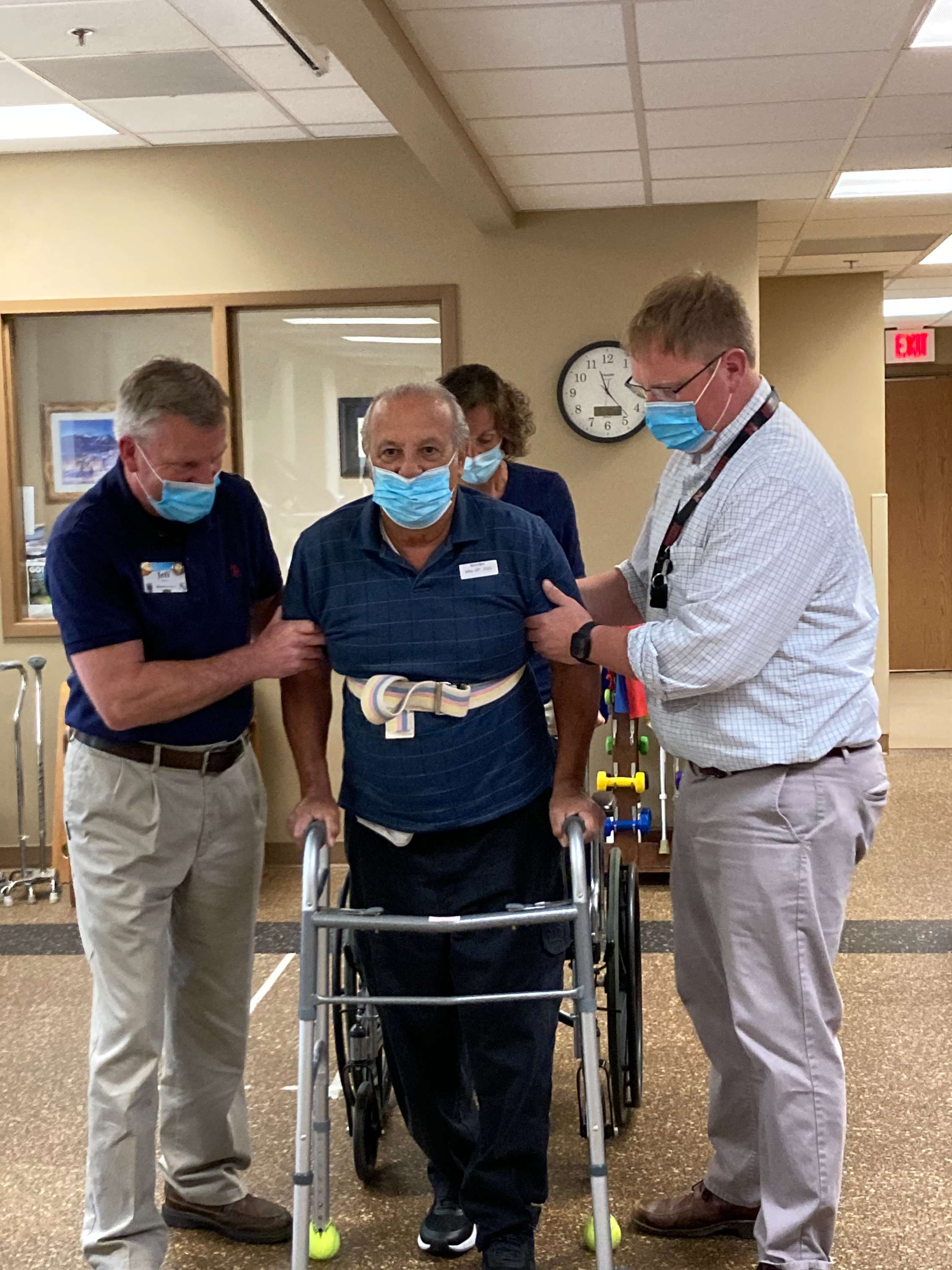
“Daniel and I have been working with George since February 22nd,” said Kyle Bowers, DPT. “He has come a long way, and it is so rewarding to see him making this kind of progress. He has gone from wiggling his toes to walking, and he continues to make progress.”
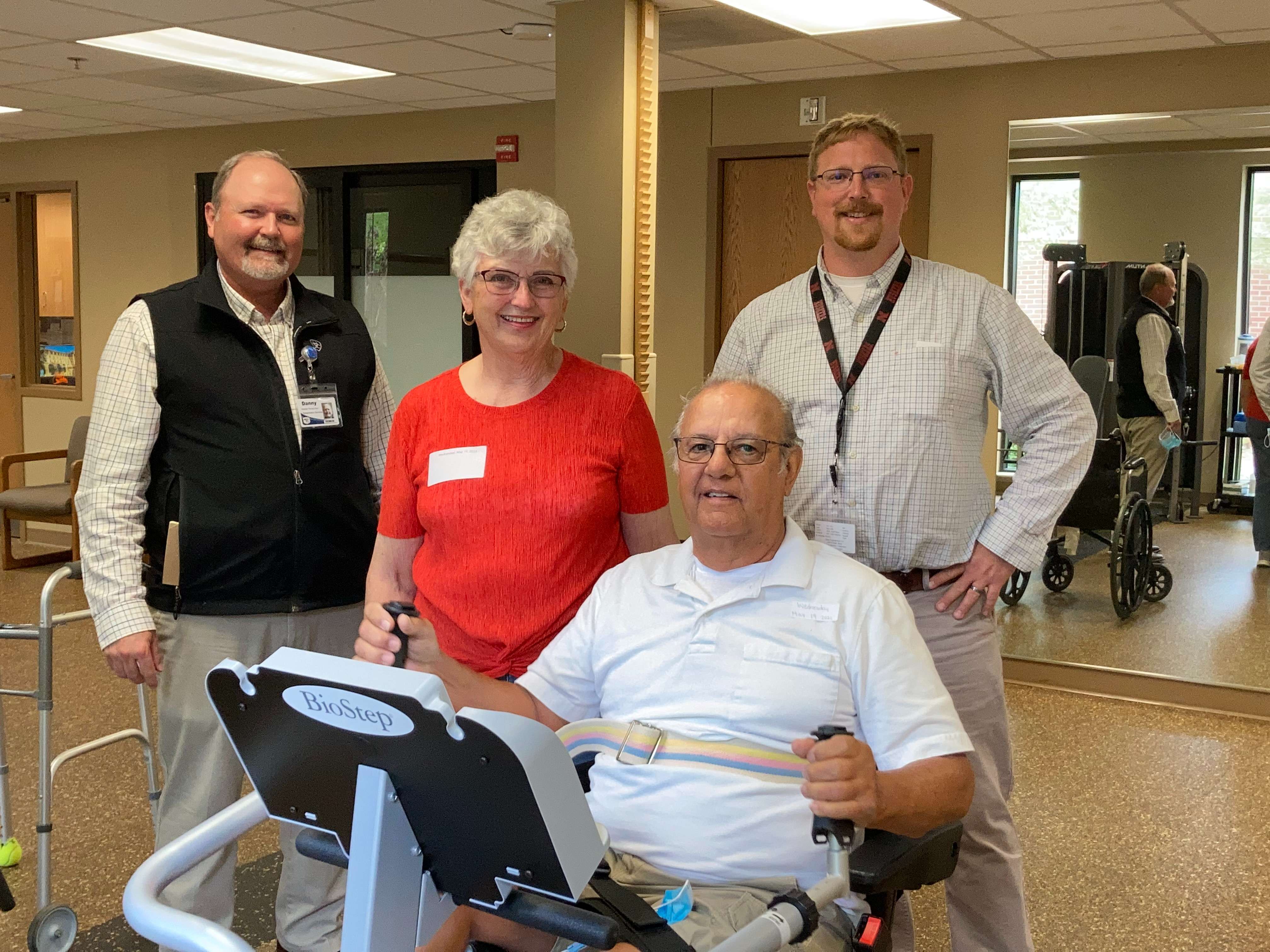
“It was a jubilant day for PT when they were able to accomplish that with him,” Millie said. “High fives, big smiles, and back slaps all around.”
“I also cannot say enough about the care and attention from our children and my siblings,” Millie said. “They gave him and me so much encouragement, provided so many meals, helped physically moving him, still help as he needs support walking in the walker at home, or getting the wheelchair unstuck outside. One of our sons took over his small business and stayed with us. They all have done for us the outside tasks needed to maintain a home. Our community made so many personal calls and cards, so many offers of help.”
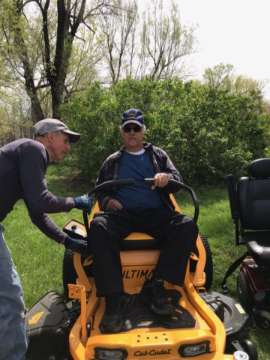
Today, George and Millie are counting their blessings, and the fact that George is here and getting stronger, making many of those things he used to do seem to be in reach again with the services and help he has received. “I guess I really have come a long way, haven't I," George said. “I think all the praying we did, and still do, definitely helps.”
. . .
Kim Stivers is community affairs director for Memorial Health System in Abilene.





